The best moments of the 2024 BAFTA Awards that you might’ve missed — on-screen and off
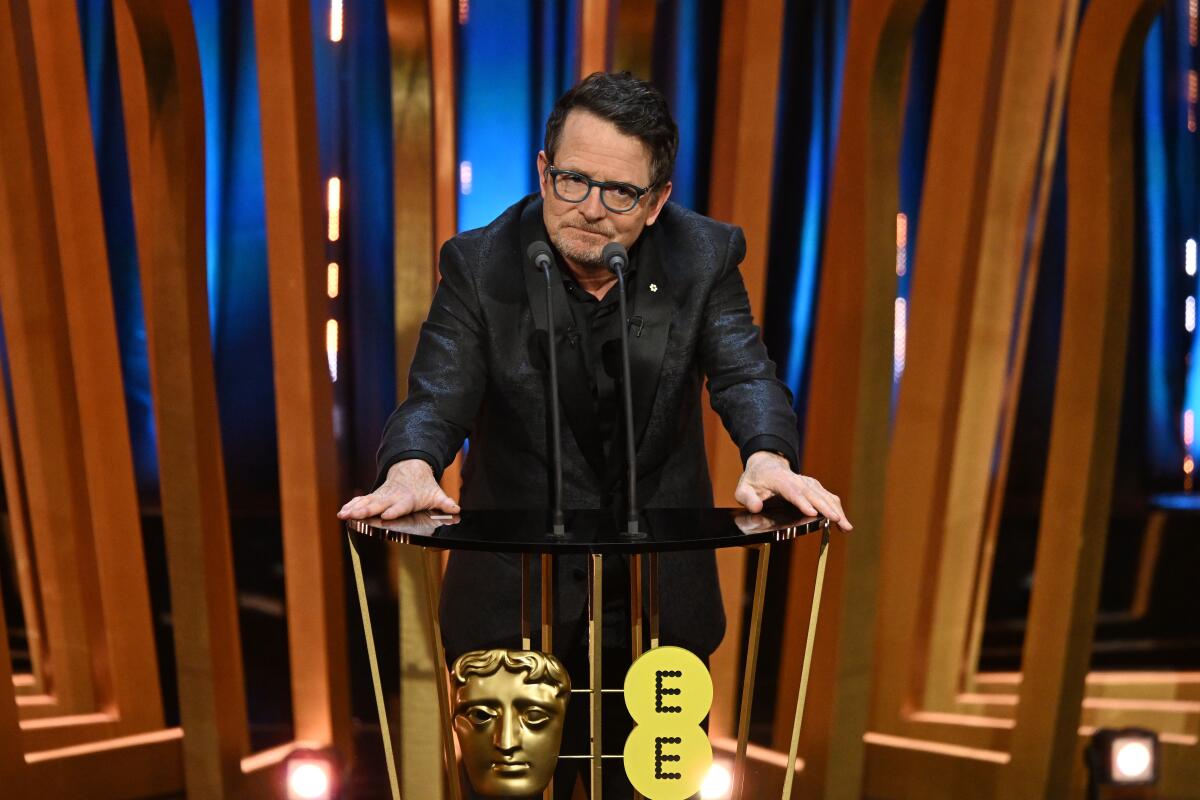
- Share via
LONDON — The 77th annual British Academy Film Awards have confirmed what pundits already know: “Oppenheimer” is the film to beat this year at the Oscars. Christopher Nolan’s opus scored for best film and director during tonight’s ceremony, held for the second year at London’s Royal Festival Hall. But while many of the winners were well-predicted, not everything that took place was quite so expected.
The BAFTAs satisfied with an amiable host, a pronounced focus on diversity and a celebration of British productions, including Jonathan Glazer’s “The Zone of Interest,” which, oddly, won both outstanding British film and film not in the English language (a first). The two-hour ceremony that aired on the BBC — as well as on BritBox streaming in the U.S. — was an edited version of what actually occurred in the room. What viewers at home didn’t see was plentiful, particularly as the cameras tended to focus on the nominees.
Here’s what happened behind the scenes of the BAFTAs.
A bit of housekeeping
After BAFTA attendees were properly lubricated at the pre-show cocktail reception, Royal Festival Hall staff had the unenviable task of herding them into the theater, where many continued to drink champagne out of paper cups. One of the last to be seated was Prince William, who arrived solo this year as the Princess of Wales is still recovering from recent surgery.
Before the show was properly underway, a few rules were laid out to the audience. One of most important notes (which was later ignored) was no clapping during the in memoriam segment. Another: “A camera could be looking at you even though you can’t see it.”
Sara Putt, chair of BAFTA, then gave a short off-air speech, noting that the organization’s aim is to “champion talent, exceptional storytelling and make the screen industries a more equitable and sustainable place.” She referenced the recent WGA and SAG strikes, but noted a year of “stellar storytelling” from the film industry.
“It’s definitely been the most talked about awards season in years,” she said to applause. “Turbo-boosted by ‘Barbenheimer,’ audiences rediscovered cinema, seeking out the talked about films and discovering some lesser known gems.”
The real Bark Ruffalo
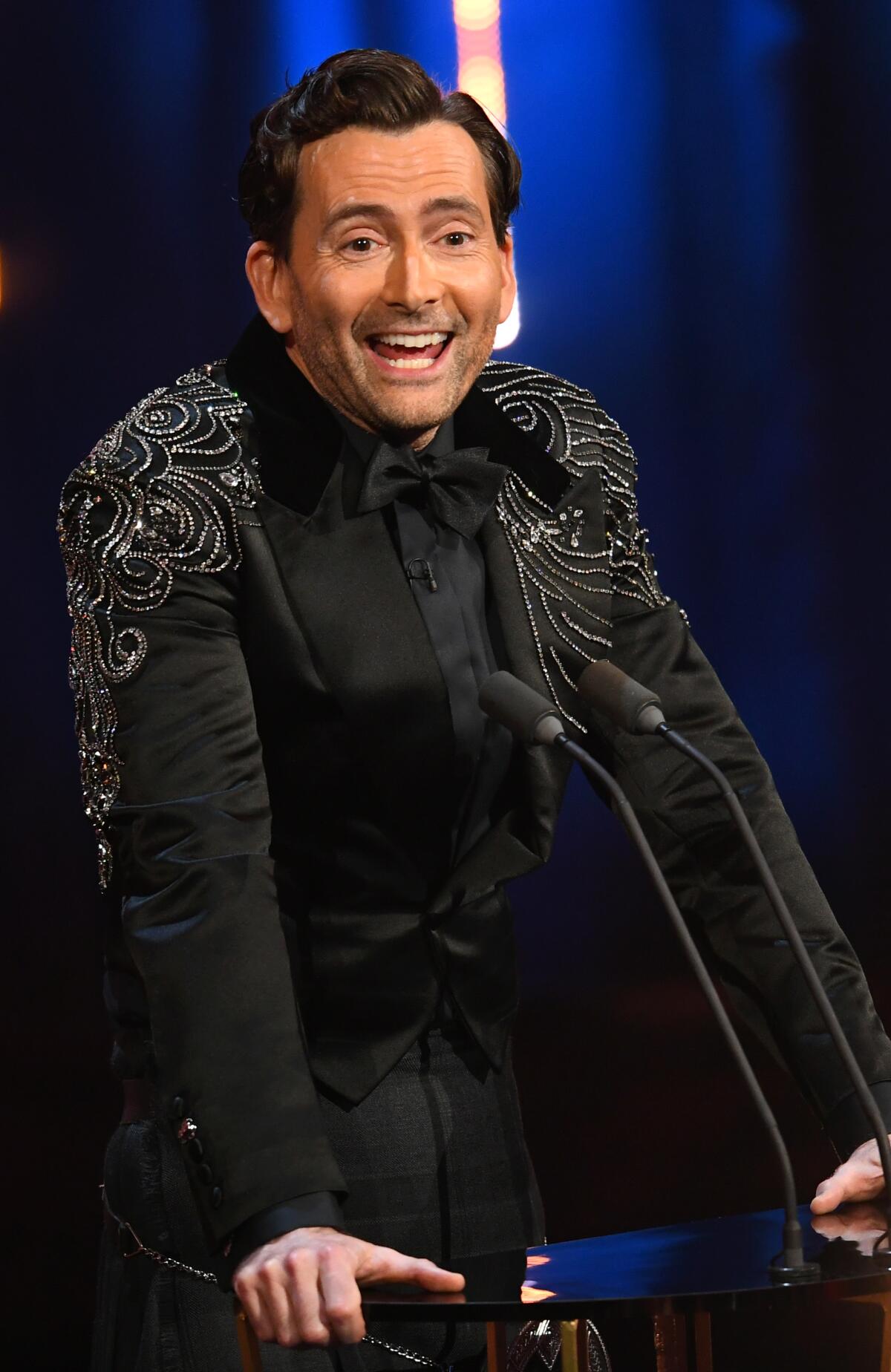
Scottish actor David Tennant (probably best known stateside for his vivid incarnation of the Doctor in “Doctor Who”) represents a younger, hipper host for the BAFTAs, which usually lean on stately icons to shepherd the evening along. He proved his comedic prowess with an opening bit about being obligated to dog-sit for Michael Sheen’s dog, Bark Ruffalo. After attempting to wrangle Dame Judi Dench and Tom Hiddleston into doing it for him, Tennant brought the dog along to the ceremony, arriving in the theater with a small white pup and its accessories in tow. To his (feigned) surprise, Sheen was in the front row, seated next to the “Saltburn” cast.
After handing Sheen the dog, Tennant joked that Bark Ruffalo was “actually being played by Andy Serkis” — who presented the first prize for original screenplay. “Playing Bark Ruffalo was, for me, a career highlight,” Serkis said on a roll, adding that many people will know the dog from “The Bone of Interest” and “Paw Things.”
The dog vanished backstage after the opening bit and, in fact, was not Sheen’s dog at all. Bark Ruffalo is actually a Maltese named Lilliput, who may be the first dog to get BAFTA accreditation, according to her manager Paula Stewart.
“Poor Things” sweep
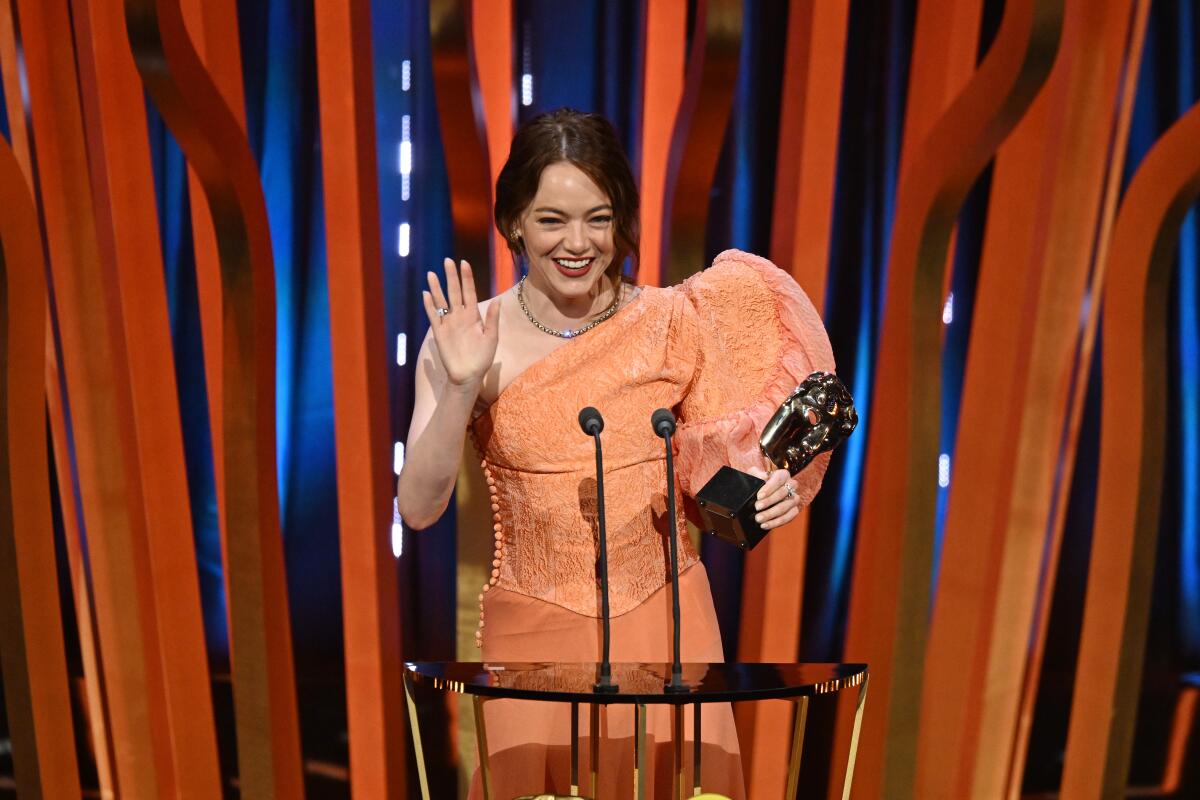
Early on, it became clear that Yorgos Lanthimos’ “Poor Things” had a grip on BAFTA voters, particularly in the crafts categories. The film triumphed in the second category honored, for special visual effects, to deafening applause and went on to win for costume design, makeup and hair and production design.
Many of the winners enthused about Lanthimos’ creative, risk-taking vision in their acceptance speeches, although the director himself didn’t win. Makeup artist Nadia Stacey credited Lanthimos for letting her team “go crazy,” while costume designer Holly Waddington described the film as an “experiment like no other.” Although BAFTA members don’t always vote in line with Academy, “Poor Things” just might prevail over “Barbie” at the Oscars.
Mr. Who?
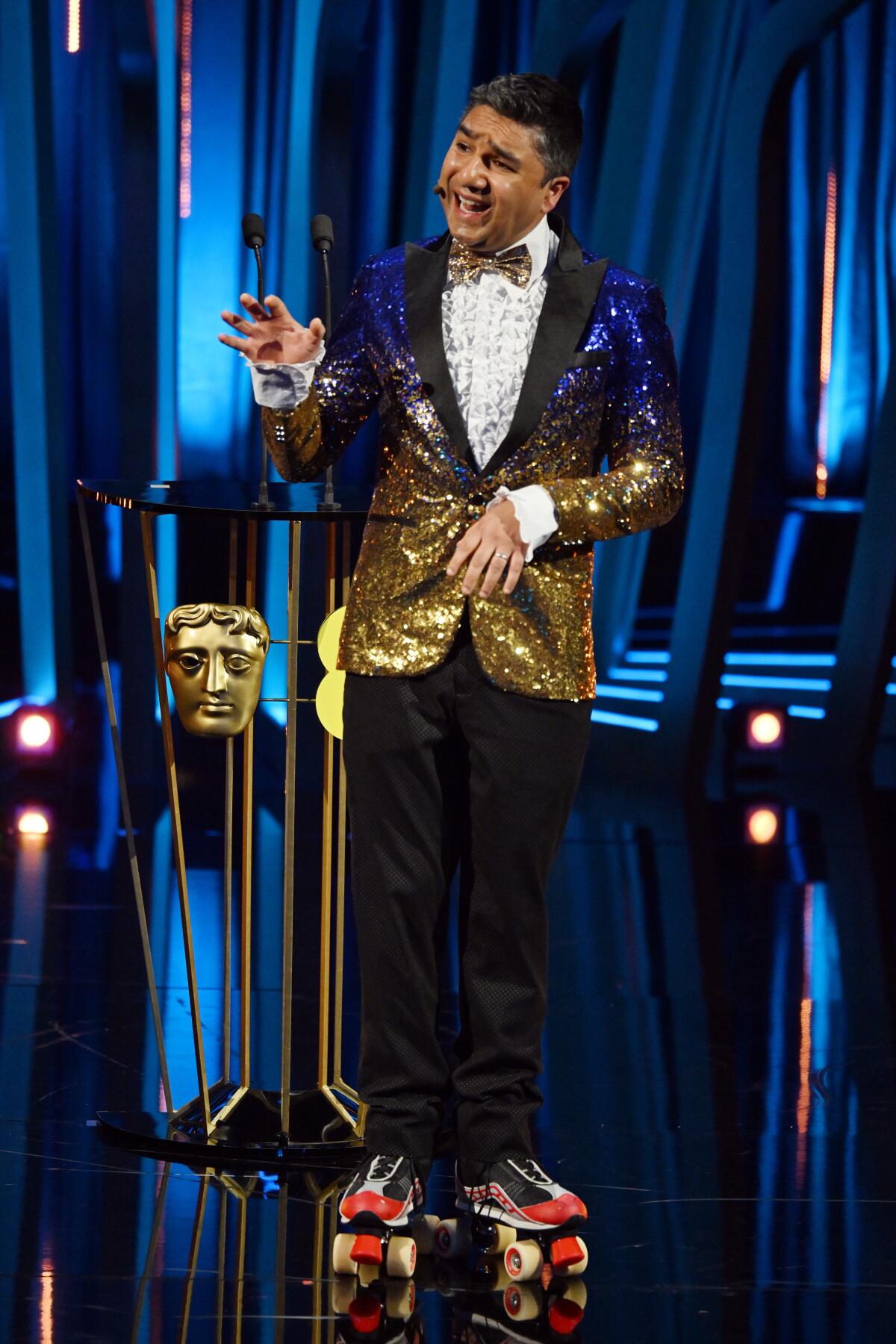
Fans of “Ted Lasso” may be aware of Nick Mohammed’s character Mr. Swallow, but non-British audiences likely had no idea what was happening when the actor emerged onstage in roller skates. His appearance, billed as an interlude for the audience, brought a few jokes — and a perfect bathroom break. The theater literally thudded with the sound of high heels as attendees flooded out while Mohammed offered his own housekeeping notes, including a directive to “vacate in height order” in case of emergency. “We’re about 10 percent of the way through,” he told the crowd, most of whom were still on their way back from the toilets.
#BAFTAsNotSoWhite
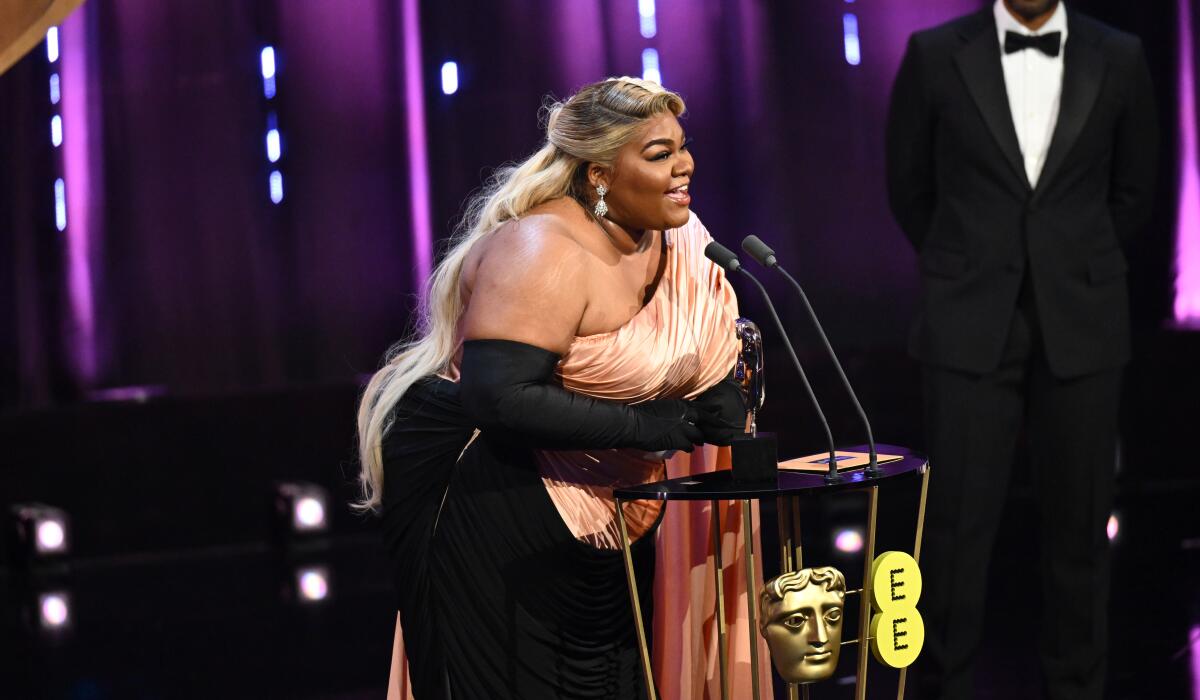
BAFTA has come under fire in recent years for its lack of diversity, both in terms of nominees and winners. Last year, the entire winners pool was white, despite a major reform in 2020 to ensure more diversity in the acting categories and for the award for best British film. Finally, that effort paid off. Da’Vine Joy Randolph won supporting actress for “The Holdovers.” Through tears, she praised her character, noting “Mary is so much bigger than me. She showed us all what is possible when we look behind the differences.”
Later, Yasmin Afifi’s “Jellyfish and Lobster” won best British short film, Cord Jefferson scored a notch for “American Fiction’s” adapted screenplay (surprisingly beating Nolan) and Savanah Leaf’s “Earth Mama” was celebrated as outstanding debut by a British writer, director or producer. But it was writer and archivist June Givanni, honored with the outstanding British contribution to cinema award, who highlighted the importance of recognizing diverse voices — and earned a standing ovation from Ryan Gosling.
Another measure of change was the sign-language interpreter, who was filmed in one of the theater boxes for broadcast on the BBC throughout the ceremony. Less successful was an accessibility ramp, which was touted as an inclusive addition to ensure all winners could get up to the stage (there was also a set of stairs). Because the ramp was in front of the “Oppenheimer” cast and crew, many of its winners, including editor Jennifer Lame, hopped up the ramp awkwardly before giving their speeches. By the time Cillian Murphy won his leading actor award, he gracefully detoured to the stairs.
Politically inclined
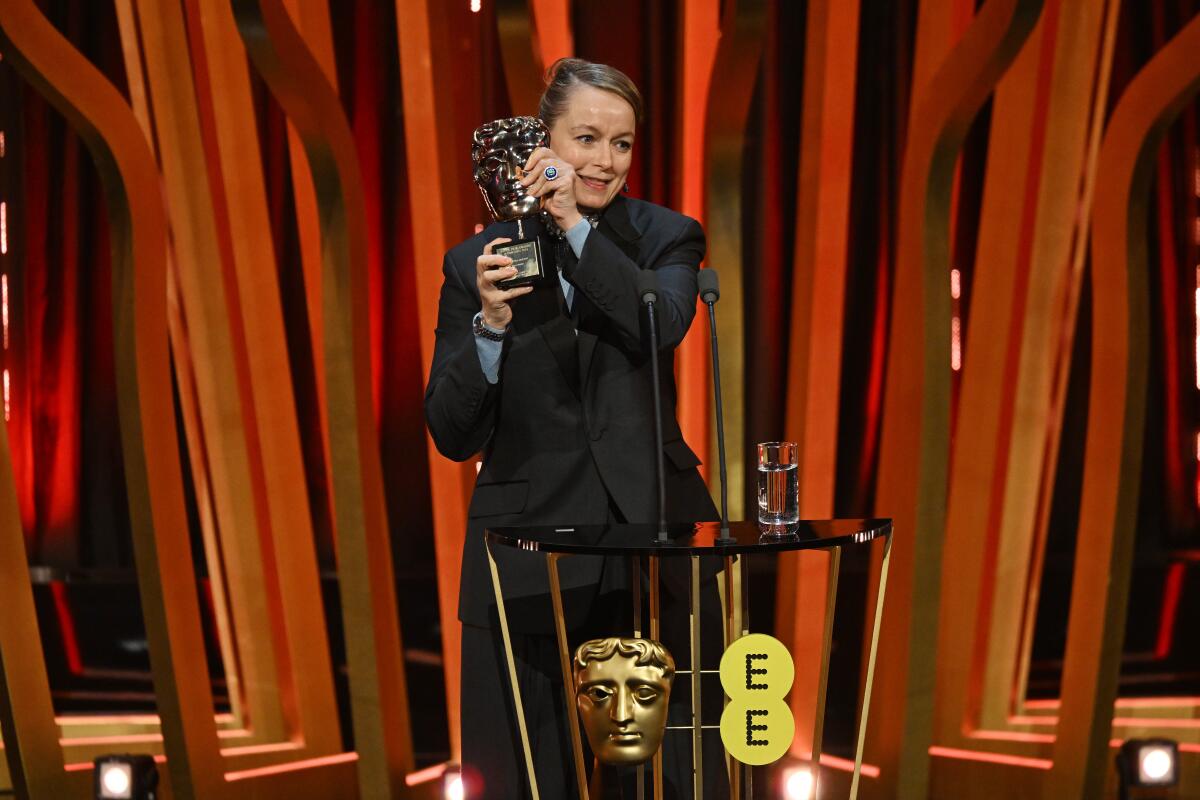
The presenters and winners kept their political statements to a minimum this year, with almost no references to global events and literally none about the British government. But “The Zone of Interest” producer Jim Wilson, accepting the award for film not in the English language alongside director Jonathan Glazer, took the opportunity to reflect on the film’s themes in parallel with current conflicts.
“A friend wrote me after seeing the film the other day that he couldn’t stop thinking about the walls we construct in our lives which we chose not to look behind,” Wilson said. He added that “we should care about innocent people being killed in Gaza or Yemen in the same way we think about innocent people killed in Mariupol or in Israel.” The cheers from the audience were so loud Wilson repeated the line, saying, “Thank you for recognizing a film that asks you to think in those spaces.”
Last year, director Daniel Roher’s “Navalny” won for documentary, prompting Tennant to reference the film and the recent death of its subject, Alexei Navalny, before bringing Taylor Russell out to announce this year’s winner. Accepting the award, “20 Days in Mariupol” filmmaker Mstyslav Chernov took the moment to draw attention to the present situation in Ukraine. “The only comfort for me is that we give voice to Ukrainians,” he said, somberly. “We keep reminding the world of what’s happening there.”
Later in the evening, Samantha Morton received the BAFTA Fellowship, the British Academy’s highest honor. Morton’s “Minority Report” co-star Tom Cruise paid tribute to her during a clip recapping her storied career, but it was Morton’s speech that caught the audience’s attention. Morton, who grew up in foster care, used the platform to recognize children growing up in poverty, recalling her own experience of being “cold” and “hungry.”
“Film changed my life, it transformed me and it led me here today,” she said, noting that watching Ken Loach’s essential 1969 drama “Kes” in school allowed her to see herself on-screen. “I dedicate this award to every child in care, or who has been in care, who is suffering or didn’t survive.” As Morton choked up, so did those in the crowd.
In memoriam
The aforementioned rule about not clapping during the in memoriam segment? The audience attempted to be respectful as Hannah Waddingham sang a beautiful rendition of “Time After Time.” However, a few guests clapped and cheered when Tina Turner flashed on-screen. For everyone else: respectful silence.
Most supportive actors
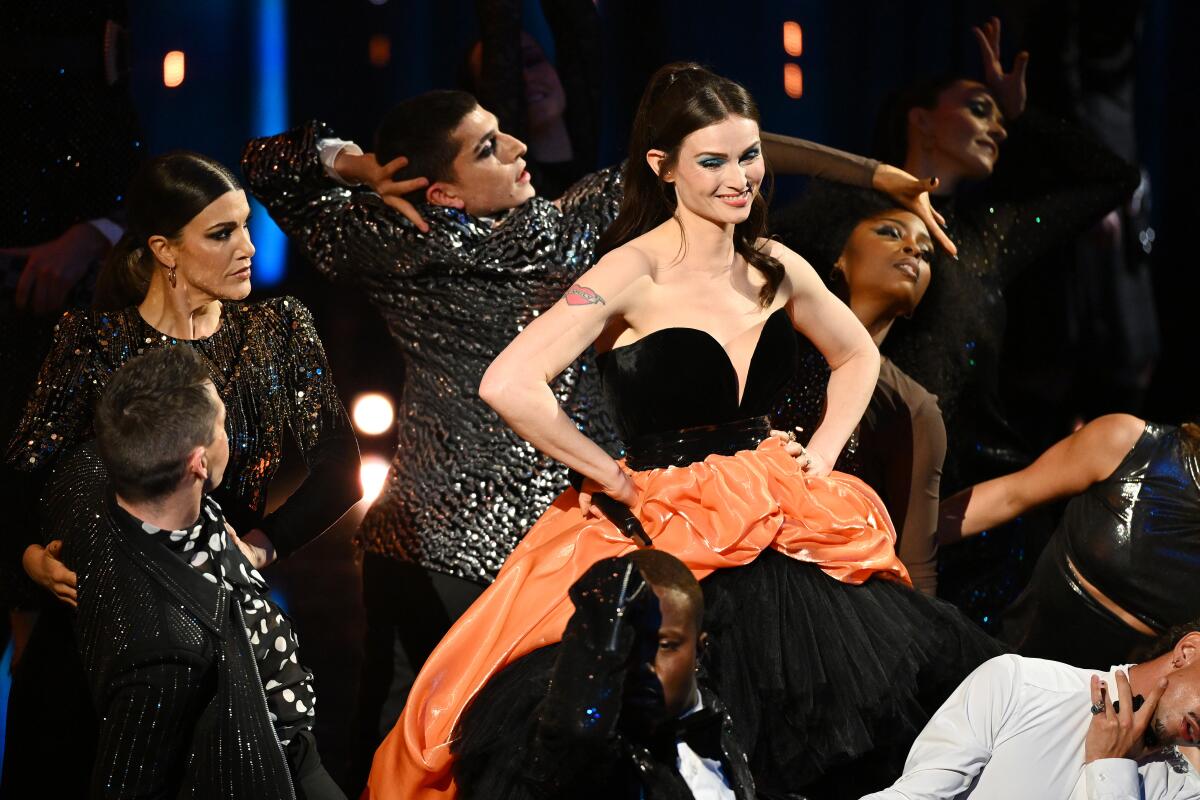
Speaking of Gosling, the “Barbie” standout may not have won supporting actor, but he was certainly the most supportive of the night. Gosling, seated in the front row near Prince William, spent the evening cheering on his fellow nominees and offering standing ovations for many. He was one of the first to stand for “The Holdovers” star Randolph and he offered Emma Stone a congratulatory squeeze as she passed by to accept the award for leading actress.
Across the aisle, “Saltburn” star Archie Madekwe was similarly supportive. He and director Emerald Fennell leapt to their feet after Sophie Ellis-Bextor’s dynamic performance of “Murder on the Dancefloor” and he was visibly excited for “How to Have Sex” breakout Mia McKenna-Bruce when she was named the EE BAFTA Rising Star.
The biggest standing ovation of the night came at the show’s end as Tennant announced that Michael J. Fox would present the award for best film — much to the surprise of the audience. The entire room got on their feet as Fox was wheeled onstage and then stood behind the lectern. It felt genuinely celebratory and generous, particularly as the actor’s documentary, “Still: A Michael J. Fox Movie,” lost to Oscar front-runner “20 Days in Mariupol.”
The afterparty
Following the three-hour ceremony, attendees made their way to more than 150 dinner tables inside Southbank Centre. Each was decorated with a themed centerpiece for one of the nominated films (the press table was “Poor Things”). Many people stayed for the official afterparty, held in the building next door, where the highlight was a saxophone player wearing a dog mask who accompanied the DJ’s selections. The song that really got the crowd going? “Murder on the Dancefloor,” of course.
A complete list of tonight’s winners
Best Film: “Oppenheimer”
Director: Christopher Nolan, “Oppenheimer”
Leading Actress: Emma Stone, “Poor Things”
Leading Actor: Cillian Murphy, “Oppenheimer”
Supporting Actress: Da’Vine Joy Randolph, “The Holdovers”
Supporting Actor: Robert Downey Jr., “Oppenheimer”
Outstanding British Film: “The Zone of Interest”
Outstanding Debut by a British Writer, Director or Producer: “Earth Mama”
Film Not in the English Language: “The Zone of Interest”
Documentary: “20 Days In Mariupol”
Animated Film: “The Boy and the Heron”
Adapted Screenplay: Cord Jefferson, “American Fiction”
Original Screenplay: Justine Triet and Arthur Harari, “Anatomy of a Fall”
Original Score: Ludwig Göransson, “Oppenheimer”
Costume Design: Holly Waddington, “Poor Things”
Production Design: Shona Heath, James Price and Zsuzsa Mihalek, “Poor Things”
Special Visual Effects: Tim Barter, Simon Hughes, Dean Koonjul and Jane Paton, “Poor Things”
Makeup & Hair: Nadia Stacey, Mark Coulier and Josh Weston, “Poor Things”
Editing: Jennifer Lame, “Oppenheimer”
Cinematography: Hoyte van Hoytema, “Oppenheimer”
Casting: Susan Shopmaker, “The Holdovers”
Sound: Johnnie Burn and Tarn Willers, “The Zone of Interest”
British Short Animation: “Crab Day”
British Short Film: “Jellyfish and Lobster”
EE Rising Star: Mia Mckenna-Bruce
More to Read
Only good movies
Get the Indie Focus newsletter, Mark Olsen's weekly guide to the world of cinema.
You may occasionally receive promotional content from the Los Angeles Times.










